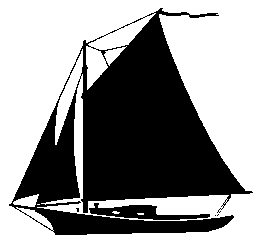Main Menu · Search ·Current Issue ·Contact ·Archives ·Centennial ·Letters to the Editor ·FAQs
 |
People will say that they have just published a book, when what they mean to say is that someone else has just published the book they wrote. Roland Sawyer Barth, Ed.D. '70, can fairly say that he has published Cruising Rules: Relationships at Sea, and he wrote it, too. Barth and Petra Nicholson, Ed.M. '87, are co-owners of Head Tide Press; this is their first publication, but others are in the works. A retired public-school educator, former senior lecturer at the School of Education, and author of three books about education that someone else published, Barth sails in Maine and Florida. His salty collection of stories may be obtained in paperback, for $15, postpaid, by calling (207) 729-7403. It will soon be available as a virtual, self-published book from "www.1stbooks.com". "Fine reading for boat-mad people, and for others too dumb to be boat-mad," writes William F. Buckley Jr. "A most perspicacious codification of existent truths," declares Roger Duncan '38, retired headmaster of the Belmont Hill School, party-boat skipper, and sailing writer. Here's Cruising Rule 24.
Embarking on a cruise, or even a daysail, is an exciting and complex event. Details are crucial: provisions, flotation devices, charts, sleeping bags, zucchini. And timing. If the Captain pronounces that the vessel will depart at 10 a.m., guests should arrive at the dock well beforehand. Occasionally, the Captain may arrive first, but under no circumstances must he ever have to wait for a guest's late arrival. Missing the tide or wasting a wind makes the Captain cranky.
But having to be on time at the beginning of a cruise is less important than not having to be on time at the end. No guest should ever come aboard with impending commitments ashore. While at sea, safety, navigation, and sailing the wind, not the obligations of the guests, must be the Captain's priorities. When the concerns of guests are put before the laws of nature, a price will be paid.
Ask Reverend Fred. As a guest on Sazerac one weekend, he insisted on being back ashore to greet his flock by 11 a.m. one Sunday morning. Before the sun had risen, we had to vacate a perfectly safe anchorage on an offshore island, set out into a gale, and sail double-reefed through eight-foot seas across Muscongus Bay to get back to the mainland. The dinghy capsized, we lost the oars, fractured the gaff (again), and we had to tie the pastor into the cockpit with docking lines, as green water broke over the top of the cabin house and the clergyman. Periodically, the good Reverend lost his lunch over the side. Several times we nearly lost him. Reverend Fred still contends that he prayed all the way across and would, in the time-honored tradition, have promised God to build Him a church, if safely delivered, had they not already had a perfectly good one in Portland.
Upon setting foot on land, the vicar--ashen, soaking wet, dehydrated, nauseated, but grateful for my part in his safe deliverance--removed his handsome, dripping bowtie [Geneva bands], in which he had left the island clad for worship, and presented it to me in somber supplication. It still adorns my closet door. And every time I see it, it reminds me of Cruising Rule 24: Never let anyone on board who has to get off board...for God's sake!
The service commenced at 11 a.m. sharp, with Reverend Fred at the helm. To this day, that sermon evokes considerable reflection among the parishioners.